The rise of artificial intelligence (AI) is bringing significant changes to higher education. As AI increasingly takes over technical hard skills and repetitive tasks, it is important for universities to shift their focus to developing students’ soft skills—qualities that are difficult for machines to replicate. The University of Macau (UM) addresses this challenge through its whole-person educational philosophy. By leveraging residential colleges and the Honours College—two key platforms for diverse learning, UM provides students with opportunities to engage in cross-disciplinary learning, teamwork, and community service. These experiences systematically equip students with the well-rounded skills needed to thrive in the AI era.
The shifting educational mission in the AI era
In exclusive interviews with Guangming Daily’s magazines Educator and Studying Abroad, UM Rector Yonghua Song highlights the core mission of university education in the AI era: to ‘cultivate essential human capabilities that machines cannot replace’. These capabilities include creative thinking, effective communication and collaboration, and ethical decision-making when facing complex problems. Skills such as innovation, communication, and social responsibility are not only critical for the future of society but also form the foundation of the soft skills UM seeks to instil in students through the whole-person education model.
At the undergraduate level, UM implements a whole-person education model that emphasises the development of competencies including knowledge integration, teamwork and collaboration, responsible citizenship, as well as service and leadership. This model is delivered through a coordinated effort between faculties and residential colleges (RCs), creating a well-rounded experiential learning environment. In this setting, students not only acquire knowledge and improve their critical thinking in the classroom, but also develop essential soft skills through a diverse range of campus activities.
‘However advanced AI technology becomes, society will always be centred on people. Our education must focus on fostering innovation and problem-solving skills while also nurturing empathy and humanistic care,’ says Mok Kai Meng, UM’s vice rector for Student Affairs, in a lecture to RC student leaders at the start of the academic year. Prof Mok explains that RCs, as vital cross-disciplinary and cross-cultural platforms at the university, bring together students from different backgrounds and play an integral role in implementing whole-person education. In RCs, resident fellows act as facilitators. They inspire and encourage students to take initiative, explore independently, and embrace new challenges. This experiential learning approach enables students to gradually develop skills such as coordination, innovative thinking, problem-solving, and organisational collaboration.
Creating opportunities to develop soft skills
This student-centred educational approach is seamlessly integrated into the RC experiential and activity-based learning environment, where every activity and task is designed to help students develop essential soft skills.
Academic support is one of the essential components of RC education to foster collaboration and innovation. For example, the Residential College Academic Tutorial Programme on big data analysis utilises a ‘train the trainer’ model. In this programme, a group of students first receive training in big data analysis. These students then serve as instructors, sharing their newly acquired knowledge with peers, delving deeper into the subject together, and exploring real-world applications of data on campus. This approach not only promotes self-discipline and independent learning but also challenges student instructors to manage teaching, lead group discussions, and inspire creative thinking. With consistent practice, participants develop stronger organisational and communication skills as well as a greater sense of responsibility.
Activity-based learning is another important measure RCs adopt to develop students’ soft skills. For example, members of house associations and floor committees in each RC gain hands-on experience by organising a variety of arts and sports events for their fellow students. As students plan and manage these events, they face real-world challenges such as working within limited budgets, securing venues, making events more appealing, and increasing student participation. By overcoming these challenges, students build valuable skills in resource management, teamwork, collaboration, and innovative event planning.
Systematic training also plays a crucial role in enhancing soft skills. According to Wan Wai San, associate master of Stanley Ho East Asia College, RCs provide various training programmes, such as pre-orientation care sessions and communication skills workshops. Students are encouraged to apply the skills they gain from these programmes to their roles in sports teams, arts groups, and student associations. By planning and executing events, and subsequently reflecting on the outcomes, students continuously refine their practical skills. This approach exemplifies the concept of ‘learning by doing’.
From ‘passive participation’ to ‘active exploration’
Resident fellows play a vital role in helping students uncover their strengths and push beyond their limits. By recognising each student’s potential, fellows create meaningful opportunities for skill development in practical service and leadership. Un Sam I, a resident tutor at Choi Kai Yau College (CKYC) and a postgraduate student in the Master of Public Administration programme, is both a beneficiary and a strong advocate of this educational philosophy.
Un’s journey began with a passive approach to college life, where she focused solely on her academic studies. This changed when her resident fellow, Li Wai Chung, discovered Un’s previous experience with choir singing and encouraged her to join the RC choir. Recognising her potential, Dr Li invited Un to perform at the high table dinner, a milestone that gradually built her confidence. Later, Dr Li recommended Un for the role of choir leader, where she took on new responsibilities such as organising regular rehearsals and leading performances. Beyond her college roles, Un joined the cabinet of the UM Choir, where she coordinated semesterly campus concerts at the Student Activity Centre theatre. These experiences gave her valuable opportunities to develop skills in team management, project planning, and leadership.
To further support her growth, Dr Li recommended Un for the Student Affairs Office’s soft skills and leadership development programme. Through this programme, Un joined other outstanding students from different faculties to receive systematic training in interpersonal communication, teamwork, crisis management, and decision-making. Now, as a resident tutor at CKYC, Un is committed to paying forward what she has learned. She mentors new students, organises activities such as ‘Exploring Old Streets in Macao’, and leads exchange and study trips to the Chinese mainland. Just as Dr Li once inspired her, Un now motivates other students to transition from ‘passive participation’ to ‘active exploration’.
A soft skills training ground for outstanding students
As a nurturing hub for the university’s most outstanding students, the UM Honours College (HC) focuses on more than just academic excellence. HC also emphasises the cultivation of empathy, a sense of service, and social responsibility, creating a holistic system for student development. The college offers a wide range of opportunities, including studying at top universities abroad, participating in interdisciplinary research projects, engaging in service learning initiatives, and interacting with local and global leaders. These experiences are designed to broaden students’ global perspectives while fostering their commitment to making meaningful contributions to society.
Deng Liyu, a fourth-year student in the Department of Communication and an HC member, exemplifies how the college empowers students. ‘The Honours College has significantly enriched my university experience,’ she shares. ‘Not only have I met exceptional students from different faculties, but I’ve also had opportunities to better understand society and contribute to it through HC-organised activities.’ With HC’s recommendation and full sponsorship, Deng participated in a study programme at the University of Michigan in Ann Arbor. There, she interacted with outstanding students from around the world, which expanded her global perspective. During her time at UM, Deng also volunteered at a nursing home as part of an HC-organised service project. Her weekly visits with the elderly over the course of a semester left a profound impact on her. Listening to their stories not only strengthened Deng’s empathy but also gave her a new appreciation for a familiar Chinese saying: ‘Care for elders as you would want others to care for your own.’ This experience helped Deng develop a stronger sense of social responsibility, laying the groundwork for her subsequent leadership journey.
In her second year, Deng was elected president of the HC Student Association. In this role, she built a team of ten students and led them in organising impactful events from start to finish. These included a Middle East analysis session and a workshop on the African food crisis in collaboration with Caritas Macau, both aimed to raise awareness of global social issues. Deng’s team also planned cultural and entertainment events, such as a talent show, which provided students with a chance to de-stress and showcase their abilities. The talent show was well-received, with nearly 100 faculty members and students attending. Reflecting on her journey, Deng says, ‘A person’s true ability is not just measured by their professional knowledge but also by their willingness to take responsibility, inspire change, and make sure everyone on the team is heard and respected.’
Teaching soft skills as a social responsibility
As the first honours college established by a Macao higher education institution, UM HC is committed to cultivating innovative and competitive future leaders, attracting a large number of applications from outstanding students each year. Rose Lai Neng, dean of HC, shares her thoughts on the qualities that define talent in today’s world: ‘True talent is not just about professional knowledge; it’s also about understanding human nature. This understanding isn’t something that comes from titles alone—it must be developed through real-world experiences.’
Prof Lai emphasises that in the age of AI, humanistic qualities and innovative thinking are more important than ever. She explains that self-cultivation, rooted in improving the well-being of others and leading by example, lies at the heart of humanistic qualities. Furthermore, true talent requires thinking creatively, balancing competing interests, and making ethical, responsible decisions in complex situations. ‘HC students are not only expected to excel academically but also to transform their knowledge into innovative solutions, collaborate effectively with peers from diverse backgrounds, and build trust through teamwork,’ she says. ‘At the same time, with greater ability comes greater responsibility.’ Prof Lai highlights that HC encourages students to take part in community service projects, which are designed to combine teamwork, empathy, and practical execution with a strong sense of social responsibility.
Redefining success in the AI era
In the AI era, success is no longer defined solely by technical expertise. True competitiveness increasingly lies in soft skills and human values—qualities that technology cannot easily replicate. To address these shifting demands, UM leverages the diverse learning and practice platforms of its residential colleges and Honours College. By promoting innovative problem-solving, teamwork, and active social engagement, the university helps students develop moral integrity, effective communication skills, and a strong sense of responsibility. These skills not only prepare students to adapt to future societal changes but also empower them to contribute meaningfully to social progress. This holistic approach highlights UM’s dedication to equipping students for the challenges and opportunities of the AI age.
Chinese Text: Kelvin U
Chinese Editor: Gigi Fan
English Translation: Bess Che
Photo: Editorial Board, with some provided by interviewees
Source: My UM Issue 146
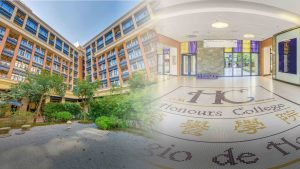
UM’s dual platforms for developing soft skills to succeed in the AI era
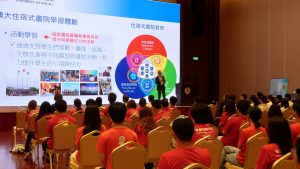
Prof Mok Kai Meng delivers a lecture to RC student leaders

RC activities provide students with opportunities to develop soft skills
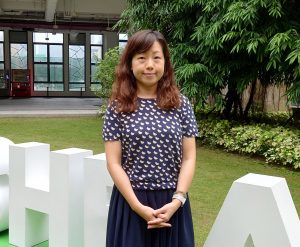
Dr Wan Wai San
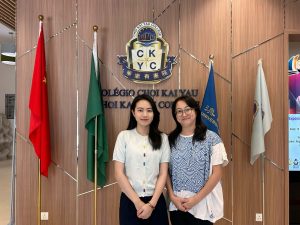
Un Sam I and Dr Li Wai Chung
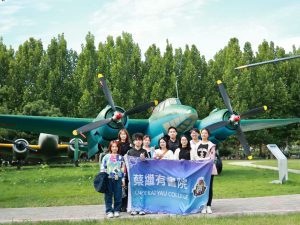
Un Sam I leads an exchange trip to the Chinese mainland
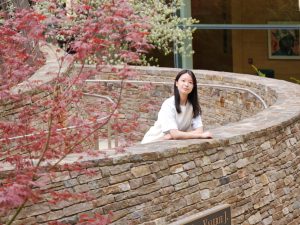
Deng Liyu participates in a study programme at the University of Michigan in Ann Arbor
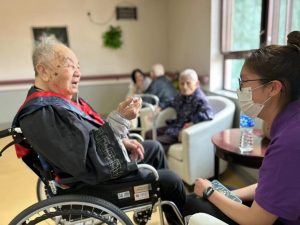
The Honours College organises a service learning activity at a nursing home
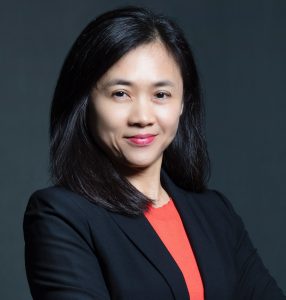
Prof Rose Lai Neng

